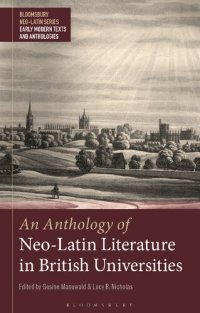
Ebook: An Anthology of Neo-Latin Literature in British Universities
- Year: 2022
- Publisher: Bloomsbury Academic
- Language: English
- pdf
Compiled by a team of experts in the field, this volume brings to view an array of Latin texts produced in British universities from c.1500 to 1700. It includes a comprehensive introduction to the production of Neo-Latin and Neo-Greek in the early modern university, the precise circumstances and broader environments that gave rise to it, plus an associated bibliography. 12 high-quality sections, each prefaced by its own short introduction, set forth the Latin (and occasionally Greek) texts and accompanying English translations and notes. Each section provides focused orientation and is arranged in such a way as to ensure the volume’s accessibility to scholars and students at all levels of familiarity with Neo-Latin. Passages are taken from documents that were composed in seats of learning across the British Isles, in Oxford, Cambridge, Dublin, Edinburgh and St Andrews, and adduce a wide range of material from orations and disputational theses to collections of occasional verse, correspondence, notebooks and university drama.
This anthology as a whole conveys a sense of the extent of Latin’s role in the academy and the span of remits in which it was deployed. Far from simply offering a snapshot of discrete projects, the contributions collectively offer insights into the broader culture of the early modern university over an extended period. They engage with the administrative operations of institutions, pedagogical processes and academic approaches, but also high-level disputes and the universities’ relationship with the worlds of politics, new science and intellectual developments elsewhere in Europe.
This volume, the third in the series of Neo-Latin anthologies in the Bloomsbury Neo-Latin Series, presents a rich medley of texts produced within the British universities across England, Ireland and Scotland during the sixteenth and seventeenth centuries. While there exist a number of disparate articles about university Neo-Latin collections and stand-alone translations of Latin works composed in the university, this volume is unique in assembling this type of writing in such a targeted and systematic way. It is also one of the first to engage frontally with the application of Greek within the higher education systems of this epoch. Latin and Greek dominated the intellectual life of the early modern period, and this anthology examines the various institutional contexts in which these languages were utilized, and, in turn, the light they can collectively shed on the character of the early modern university. The volume brings together extracts of both verse and prose, pieces written individually, but also collaboratively. It includes the more familiar categories of academic writing, such as orations and occasional poetry, but also makes available other forms that have hitherto been rather more hidden from view, owing to the fact they were almost exclusively composed in Latin and Greek, such as disputational theses and tripos verse. Independently and cumulatively, the various texts in this volume offer a myriad of clues about the priorities, power dynamics and broader culture of the age, and stand as a yet further reminder of the fundamental place of Latin and Greek within it.
This anthology as a whole conveys a sense of the extent of Latin’s role in the academy and the span of remits in which it was deployed. Far from simply offering a snapshot of discrete projects, the contributions collectively offer insights into the broader culture of the early modern university over an extended period. They engage with the administrative operations of institutions, pedagogical processes and academic approaches, but also high-level disputes and the universities’ relationship with the worlds of politics, new science and intellectual developments elsewhere in Europe.
This volume, the third in the series of Neo-Latin anthologies in the Bloomsbury Neo-Latin Series, presents a rich medley of texts produced within the British universities across England, Ireland and Scotland during the sixteenth and seventeenth centuries. While there exist a number of disparate articles about university Neo-Latin collections and stand-alone translations of Latin works composed in the university, this volume is unique in assembling this type of writing in such a targeted and systematic way. It is also one of the first to engage frontally with the application of Greek within the higher education systems of this epoch. Latin and Greek dominated the intellectual life of the early modern period, and this anthology examines the various institutional contexts in which these languages were utilized, and, in turn, the light they can collectively shed on the character of the early modern university. The volume brings together extracts of both verse and prose, pieces written individually, but also collaboratively. It includes the more familiar categories of academic writing, such as orations and occasional poetry, but also makes available other forms that have hitherto been rather more hidden from view, owing to the fact they were almost exclusively composed in Latin and Greek, such as disputational theses and tripos verse. Independently and cumulatively, the various texts in this volume offer a myriad of clues about the priorities, power dynamics and broader culture of the age, and stand as a yet further reminder of the fundamental place of Latin and Greek within it.
Download the book An Anthology of Neo-Latin Literature in British Universities for free or read online
Continue reading on any device:

Last viewed books
Related books
{related-news}
Comments (0)